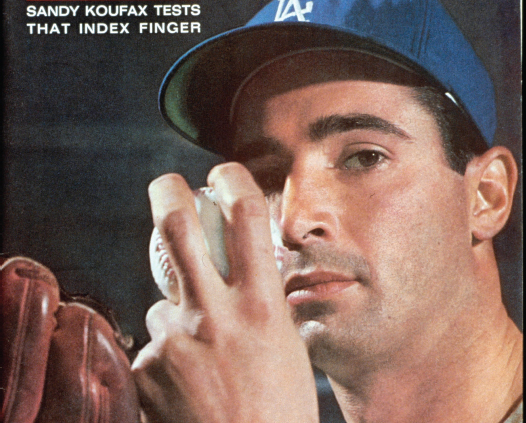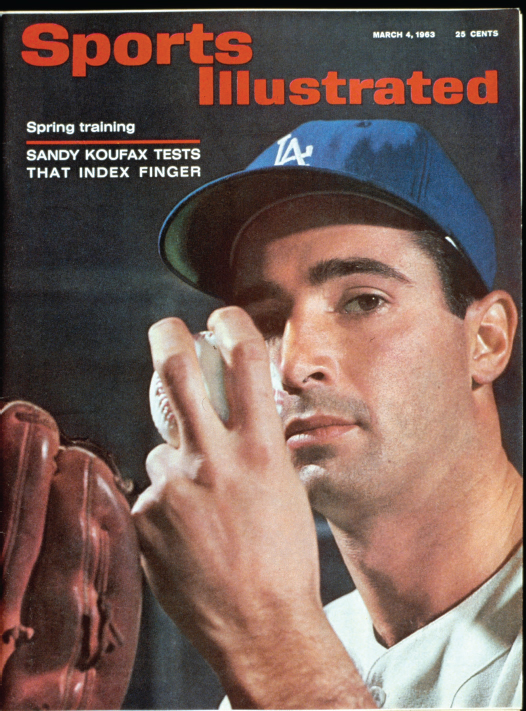September 11, 1966: Sandy Koufax throws his final career shutout to beat Astros
Sandy Koufax’s final shutout was the 40th of his career and fifth of the 1966 season. (SABR-Rucker Archive)
He had walked up the small hill 391 previous times in his big-league career. Standing atop that mound, he had accomplished so much: four no-hitters, including the only perfect game in Dodgers history, and 39 total shutouts among the many highlights. What Sandy Koufax did not know that Sunday afternoon was that he was about to throw the 40th and final regular-season shutout of his illustrious career.
On September 11, 1966, Koufax was the starting pitcher for the Los Angeles Dodgers in the first game of a doubleheader against the Houston Astros at Dodger Stadium. The Dodgers came into this game in second place in the National League,1 a half-game behind the Pittsburgh Pirates. By the time this day was over, the Dodgers were in first place, never to relinquish that top spot in the standings.
The Astros were a second-division club in their fifth season of existence. To date in the season, they had won 63 games against 82 losses, while the Dodgers, the reigning World Series champions, were 81-59.
The Dodgers had won the two preceding games from Houston, both by shutouts. On Friday night September 9, Claude Osteen threw a three-hitter and won, 7-0. On Saturday afternoon Don Drysdale threw 8⅓ innings of four-hit scoreless ball and was relieved by Phil Regan, who got the win in the bottom of the 10th.2
On the mound opposing Koufax was 19-year-old right-hander Larry Dierker, who over the course of his career won 139 major-league games. On this day he was in just his second full season but already one of the better Astros pitchers, one of three that year who won 10 or more games. Dierker won in double figures nine times in his career, including winning 20 games in 1969 (one of two seasons when he was an All-Star). When he entered the game to face Koufax that Sunday afternoon, Dierker had an 8-6 record with a 3.47 ERA.
Koufax, already a two-time Cy Young Award winner, boasted a 22-8 record and a 1.87 ERA.
This might have looked like a mismatch, but three months earlier, on June 14, these two pitchers had faced each other at Dodger Stadium and Dierker got the better of the matchup, pitching a five-hit shutout and and handing Koufax only his second loss of the season. In Dierker’s last start, on September 5, he shut out the St. Louis Cardinals.
The first batter to face Koufax was right-handed-hitting Ron Davis. Davis reached the big leagues briefly with Houston in 1962, and now in 1966 had finally made it back to the big leagues. He was no match for Koufax and struck out to begin the game.
If Koufax had thoughts about a no-hitter, he didn’t have much time to entertain them. Shortstop Sonny Jackson, the next batter, reached on an infield hit to second base. But Joe Gaines lined out to center field and Chuck Harrison was Koufax’s second strikeout victim.
In their half of the first inning, despite a leadoff single by Maury Wills, the Dodgers went down quietly after Jim Gilliam hit into a double play.
On this day, Koufax did not have it easy. That became evident in the top of the second inning. Future Hall of Famer Joe Morgan began the inning with a single and went to third on a double by the next batter, catcher John Bateman. With runners at second and third, and no outs, Koufax got Bob Aspromonte to ground out to third, struck out Aaron Pointer, and got Dierker on a pop fly to second.
On the mound in the early going, Dierker proved to be Koufax’s match. He retired the Dodgers in order in the second inning.
In the third, Koufax retired the Astros in order. Dierker allowed a leadoff hit to Lou Johnson, who was thrown out trying for a double. The next two batters were retired quickly.
In the fourth inning, Koufax again retired the Astros in order. Wills led off the Dodgers half with a bunt single. He was sacrificed to second by Gilliam. One out later, Ron Fairly singled home Wills with the first Dodgers run.
The Astros tried to answer back quickly. Aspromonte led off the fifth with a double. After Pointer flied out and Dierker struck out, Davis walked. The scoring threat ended when Jackson grounded out to second base.
The Dodgers gave Koufax a comfortable cushion in their half of the fifth. With one out, Lou Johnson reached on an error by Astros shortstop Jackson. Wes Parker walked, and the runners moved up when Astros catcher John Bateman threw wild to first on a pickoff attempt. The notoriously weak-hitting Koufax walked to load the bases. Wills’ infield single brought home the Dodgers’ second run. One out later, Willie Davis doubled home the Dodgers’ third and fourth runs. That fourth run was the second-to-last time Koufax ever scored in a game.
In the Astros’ sixth, Koufax walked a batter and in the seventh he allowed two more singles. Pointer, who hit the second single in the seventh inning, was the last Astro to reach base. A double-play grounder ended the inning, and Koufax retired the Astros in order in the eighth and ninth.
Though Koufax had to pitch out of trouble occasionally, the Fort Worth Star Telegram noted that he “breez[ed] to his 23rd victory.”3 By this point in his career, Koufax pitching well–especially against a second-division club–wasn’t big news. The Los Angeles Times commented that Koufax was “in trouble only occasionally.”4
Koufax was a great strikeout pitcher, but in this game he got by, especially in the final innings, without striking out many batters. He struck out six Astros in all and walked two. The last player to strike out against Koufax in this game was Gaines to start the sixth inning. That was the 2,357th punchout of Koufax’s career and tied him for seventh place on the all-time strikeout list with Robin Roberts.5 In his next start, against the Pittsburgh Pirates, Koufax struck out Gene Alley to take sole possession of seventh place.6
After the game, noting his lack of strikeouts in the final innings, Koufax remarked, “I had a good curve early, but in the last four innings I stuck mostly with my fastball.”7
This 40th shutout was the last of Koufax’s career. Plagued by pain in his pitching elbow, he retired in November at the age of 30. But his shutout, combined with a 1-0 whitewashing of the Astros in the second game gave the Dodgers sole possession of first place. The win in the second game closed out a four-game series with the Astros, a series in which Houston failed to score a single run.8
SOURCES
In addition to the sources cited in the Notes, the author consulted Baseball-Reference.com and Retrosheet.org.
https://www.baseball-reference.com/boxes/LAN/LAN196609111.shtml
https://www.retrosheet.org/boxesetc/1966/B09111LAN1966.htm
NOTES
1 The major leagues did not go to division play until 1969, when both leagues expanded to 12 teams.
2 The win improved Regan’s won/lost record to 13-1. Mike Cuellar went the distance for the Astros, but gave up a leadoff single to Maury Wills, who was sacrificed to second, took third on an infield grounder, and scored on a single by Al Ferrara.
3 “LA Wins Two, Takes Top Spot,” Fort Worth Star Telegram, September 12, 1966: 15.
4 Frank Finch, “Blank, Blank – Dodgers Lead Loop,” Los Angeles Times, September 12, 1966: 47.
5 “Astros Lay Goose Egg, and Dodgers on Top,” Los Angeles Evening Citizen News, September 12, 1966: 16.
6 Christy Mathewson was sixth on the all-time list, with 2,507.
7 “Wills Beef Cleared Air,” San Francisco Examiner, September 12, 1966: 64.
8 The win in the second game closed out a four-game series with the Astros, a series in which Houston failed to score a single run. The game scores were 7-0, 1-0, 4-0, and 1-0.
Additional Stats
Los Angeles Dodgers 4
Houston Astros 0
Game 1, DH
Dodger Stadium
Los Angeles, CA
Box Score + PBP:
Corrections? Additions?
If you can help us improve this game story, contact us.



